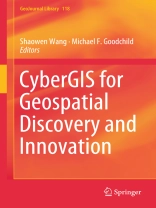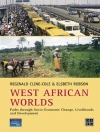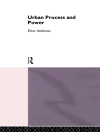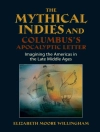This book elucidates how cyber GIS (that is, new-generation geographic information science and systems (GIS) based on advanced computing and cyberinfrastructure) transforms computation- and data-intensive geospatial discovery and innovation. It comprehensively addresses opportunities and challenges, roadmaps for research and development, and major progress, trends, and impacts of cyber GIS in the era of big data. The book serves as an authoritative source of information to fill the void of introducing this exciting and growing field. By providing a set of representative applications and science drivers of cyber GIS, this book demonstrates how cyber GIS has been advanced to enable cutting-edge scientific research and innovative geospatial application development. Such cyber GIS advances are contextualized as diverse but interrelated science and technology frontiers. The book also emphasizes several important social dimensions of cyber GIS such as for empowering deliberative civic engagement and enabling collaborative problem solving through structured participation. In sum, this book will be a great resource to students, academics, and geospatial professionals for leaning cutting-edge cyber GIS, geospatial data science, high-performance computing, and related applications and sciences.
Tabla de materias
Forward: Introduction: 1. Cyber GIS for Transforming Geospatial Discovery and Innovation: Shaowen Wang and Michael F. Goodchild.- Applications and Science Drivers: 2. Coupling Traffic and Gas Dispersion Simulation for Atmospheric Pollution Estimation: Guido Cervone et all.-3. Cyber GIS for Analyzing Urban Data : James Cheshire et all.- 4. Designing Adaptable Spatial Cyberinfrastructure for Urban e Research : Martin Tomko et all.- 5. Mapping Spatial Information Landscape in Cyberspace with Social Media : Jiue-An Yang et all.- 6. Integrating GIScience Application through Mashup: Chaowei Yang Pinde Fu et all.- Science and Technology Frontiers: 7. Crayons: Empowering Cyber GIS by Employing Cloud Infrastructure: Dinesh Agarwal et all.- 8. Enabling Spatial Big Data via Cyber GIS: Challenges and Opportunities: Michael R. Evans et all.- 9. High-Performance Small-Scale Raster Map Projection Empowered by Cyberinfrastructure: Michael P. Finn Yan Liu et all.- 10. A Smart Service-Oriented Cyber GIS Framework for Solving Data-Intensive Geospatial Problems: Wenwen Li et all.- 11. An Online Game Framework for Multi-User Spatial Agent Simulation: David Massey et all.- 12. Georeferenced Social Multimedia as Volunteered Geographic Information: Shawn Newsam and Daniel Leung.- Social Dimensions: 13.Geo Deliberative Web: Scaling Up Deliberative Civic Engagement Through Spatial Cyberinfrastructure: Guoray Cai.- 14.Towards a Community ‘Playground:’ Connecting Cyber GIS with its Communities: Dawn J. Wright Victoria Kouyoumijan, and Steve Kopp.- 15.Cyber GIS Considerations for Structured Participation Methods in Collaborative Problem Solving: Mary Roderick Timothy Nyerges, and Michalis Avraam.- An Epilogue Shaowen Wang.
Sobre el autor
Shaowen Wang
is a Professor and Head of the Department of Geography and Geographic Information Science; Richard and Margaret Romano Professorial Scholar in the College of Liberal Arts and Sciences; and an Affiliate Professor of the Department of Computer Science, Department of Urban and Regional Planning, and School of Information Sciences at the University of Illinois at Urbana-Champaign (UIUC). He has served as Founding Director of Cyber GIS Center for Advanced Digital and Spatial Studies at UIUC since 2013. He served as Associate Director of the National Center for Supercomputing Applications (NCSA) for Cyber GIS from 2010 to 2017, and Lead of NCSA’s Earth and Environment Theme from 2014 to 2017. He received a BS in computer engineering from Tianjin University, an MS in geography from Peking University, and an MS of computer science and a Ph D in geography from the University of Iowa. He was a visiting scholar at Lund University sponsored by the National Science Foundation (NSF) in 2006, and NCSA Fellow in 2007. He received the NSF CAREER Award in 2009. He was named a Helen Corley Petit Scholar for 2011-12, and Centennial Scholar for 2013-16 by UIUC’s College of Liberal Arts and Sciences.
His research interests include geographic information science and systems (GIS), advanced cyberinfrastructure and cyber GIS, complex environmental and geospatial problems, computational and data sciences, high-performance and distributed computing, and spatial analysis and modeling. He has received research funding from a number of U.S. federal agencies (e.g., CDC, DOE, EPA, NASA, NSF, USDA, and USGS) and industry; and served as Principal Investigator (PI) for more than $15 million competitive research grants, and co-PI and investigator for contributing to sponsored research supported with tens of millions of U.S. dollars. He pioneered cyber GIS and has led several multi-institution interdisciplinary projects to advance cyber GIS and related scientific problem solving in agriculture, bioenergy, emergency management, geography and spatial sciences, geosciences, and public health. He has published 100+ peer-reviewed papers including articles in 30+ journals.
He has served as an Action Editor of Geo Informatica, Associate Editor of Software X, and guest editor or editorial board member for multiple other journals, book series and proceedings. He served on the University Consortium for Geographic Information Science (UCGIS) Board of Directors from 2009 to 2012, and President of UCGIS from 2016 to 2017. He was a member of the Board on Earth Sciences and Resources of the U.S. National Academies of Sciences, Engineering, and Medicine from 2015 to 2017. He is serving on the advisory board of the NSF Extreme Science and Engineering Discovery Environment (XSEDE) program.
Michael F. Goodchild is Emeritus Professor of Geography at the University of California, Santa Barbara, where he also holds the title of Research Professor. He is also Distinguished Chair Professor at the Hong Kong Polytechnic University and Research Professor at Arizona State University, and holds many other affiliate, adjunct, and honorary positions at universities around the world. Until his retirement in June 2012 he was Jack and Laura Dangermond Professor of Geography, and Director of UCSB’s Center for Spatial Studies. He received his BA degree from Cambridge University in Physics in 1965 and his Ph D in geography from Mc Master University in 1969, and has received five honorary doctorates. He was elected member of the National Academy of Sciences and Foreign Member of the Royal Society of Canada in 2002, member of the American Academy of Arts and Sciences in 2006, and Foreign Member of the Royal Society and Corresponding Fellow of the British Academy in 2010; and in 2007 he received the Prix Vautrin Lud. He was editor of Geographical Analysis between 1987 and 1990 and editor of the Methods, Models, and Geographic Information Sciences section of the Annals of the Association of American Geographers from 2000 to 2006. He serves on the editorial boards of ten other journals and book series, and has published over 15 books and 500 articles. He was Chair of the National Research Council’s Mapping Science Committee from 1997 to 1999, and of the Advisory Committee on Social, Behavioral, and Economic Sciences of the National Science Foundation from 2008 to 2010. His research interests center on geographic information science, spatial analysis, and uncertainty in geographic data.












